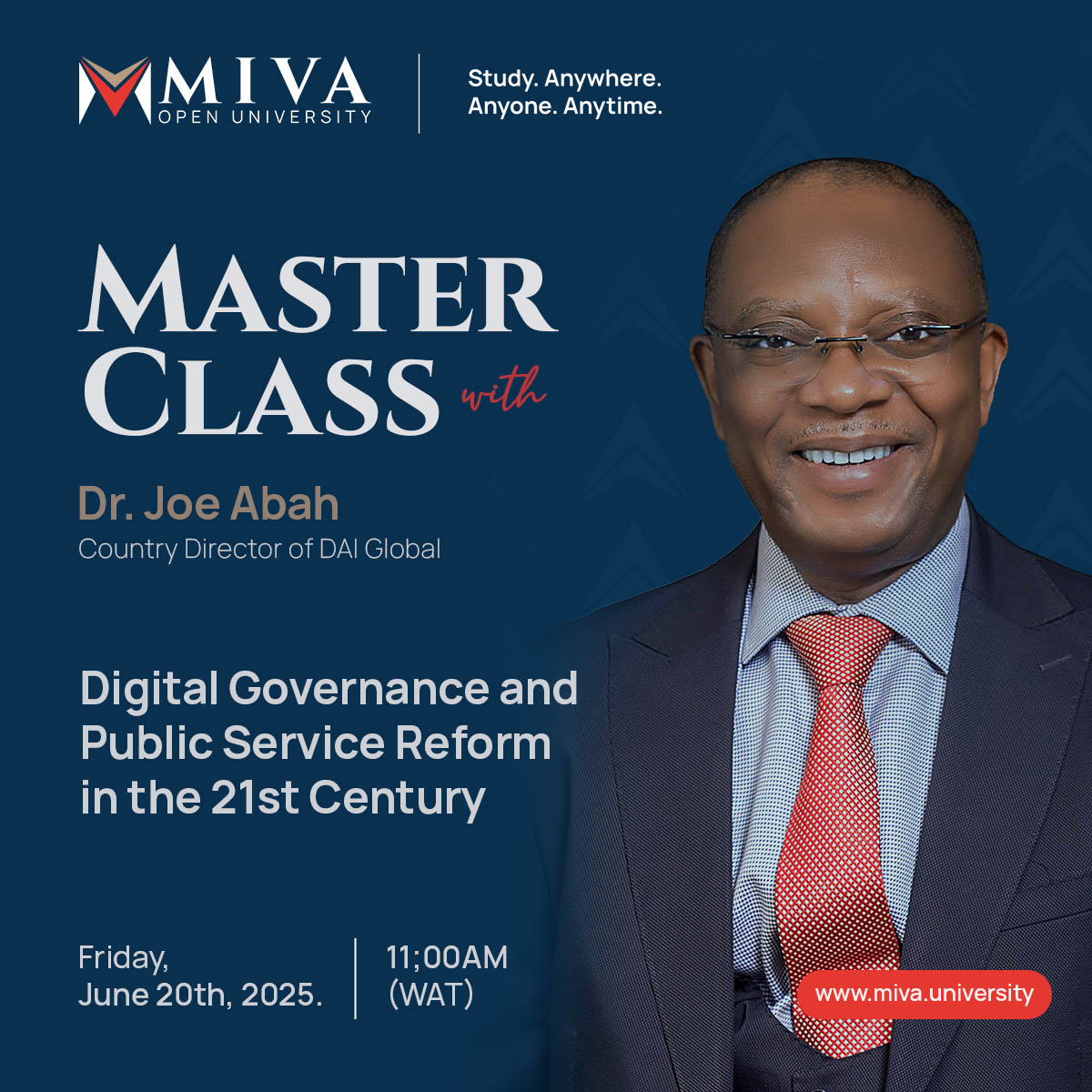What happens when the government fails to deliver basic services efficiently?
Can digital tools fix broken public systems—or just make bad ones faster?
These are the kinds of questions that affect all of us—citizens, professionals, entrepreneurs, and students alike. And they’re exactly what we explored in our June 20, 2025, masterclass at Miva Open University, titled “Digital Governance and Public Service Reform in the 21st Century”.
We had the honour of hosting Dr Joe Abah, a renowned expert in governance, institutional reform, political economy, and change management. Drawing from his extensive work in both government and international development, Dr Abah shared how thoughtful reforms—backed by strong leadership and digital tools—can improve public services that millions rely on every day.
In This Post
Dr Joe Abah’s Presentation on Digital Governance and Public Service Reform
His presentation focused on four key areas:
- What public service reform means
- Lessons from reform efforts in developing countries
- The role and challenges of digital governance
- Future trends in digital governance
1. Understanding Public Service and the Need for Reform
Dr Abah began by defining public organisations as government-funded institutions responsible for delivering essential services that private companies either can’t provide or won’t offer affordably, such as national defence, education, and basic healthcare.
He explained the difference between public and civil servants, a distinction often misunderstood:
“All civil servants are public servants, but not all public servants are civil servants.”
He highlighted that public service reform must focus on one thing above all: the citizens’ experience. Whether it’s applying for a passport or being stopped by the police, those interactions shape public trust.
“Public service reform is the process of making the experience of citizens better whenever they come into contact with their governments,” Dr Abah stated.
2. Why Reforms Fail (and What Actually Works)
Drawing from reform efforts in Nigeria and other developing countries, Dr Abah outlined several common mistakes and how to avoid them.
- Ignoring politics leads to failure. He stressed that technocratic approaches alone don’t work.
- Sudden downsizing doesn’t work either. Gradual changes are more sustainable.
- Passing laws is not enough. Behaviour change must follow.
- Copying foreign models blindly often fails. Context is everything.
Instead, he urged reformers to tailor solutions to local realities, measure what matters, and focus on merit and performance.
He said, “Monitoring public sector performance is difficult… but it’s possible to do. And when you do it, it’s actually quite rewarding, particularly if you share the results with the public.”
3. Digital Governance: A Game-Changer With Its Own Challenges
Dr Abah then turned to how technology is reshaping governance, citing examples like:
- The expansion of the National Identity Number (NIN) from 7 million to over 110 million records
- Digital case management tools in the courts
- Automated border e-gates that reduce human interference
Digital governance offers lower costs, faster services, and more transparency. However, it also threatens entrenched interests.
“If the e-gates are working, then who wants to join immigration anymore?” he asked, pointing to resistance from those who benefit from inefficiency and corruption.
To succeed, digital reforms must be enforced with strong leadership and a willingness to disrupt the status quo.
4. Future Trends in Digital Governance
According to Dr Joe Abah, these are the major trends shaping the future of digital governance:
- Artificial Intelligence (including for policy formulation, resource allocation, procurement and even decision-making)
- Blockchain
- Universal Digital Identity Systems
- Super Apps that can handle most applications for government services
- Smart Cities and Internet of Things
- Rising Cybersecurity Threats
- Ethics
These trends highlight a clear direction: governments must become smarter, more transparent, and more citizen-focused.
Building Capacity: More Than Just Training
Dr Abah also challenged the overemphasis on traditional workshops for civil servants.
“Civil servants have far more capacity than you ever knew. Every day, they say, ‘We lack capacity. Train us.’ We’ll go to Hilton for a workshop, and eat all the tea breaks.”
Instead, he argued for peer learning, real-world experience, and environments where people are expected—and supported—to use the tools they’re given.
He shared a personal story about his daughters, who intern while studying, and one of them in particular, who took a gap year off university to work in the legal department of his organisation. That one year, he said, gave her more practical insight than textbooks alone ever could.
Closing Thoughts
Reform is never finished. It’s a continuous effort to make government more responsive, efficient, and citizen-focused. And digital governance, when implemented well, offers an incredible opportunity to transform public services.
From building national ID systems to embedding reforms in everyday practice, Dr Abah’s insights made clear that digital governance is not just about technology; it’s about leadership, context, and people.
To learn more about the university’s programmes, admissions, and other offerings, visit our website: www.miva.university or contact an admissions advisor on WhatsApp: +234 9132 300 000.


